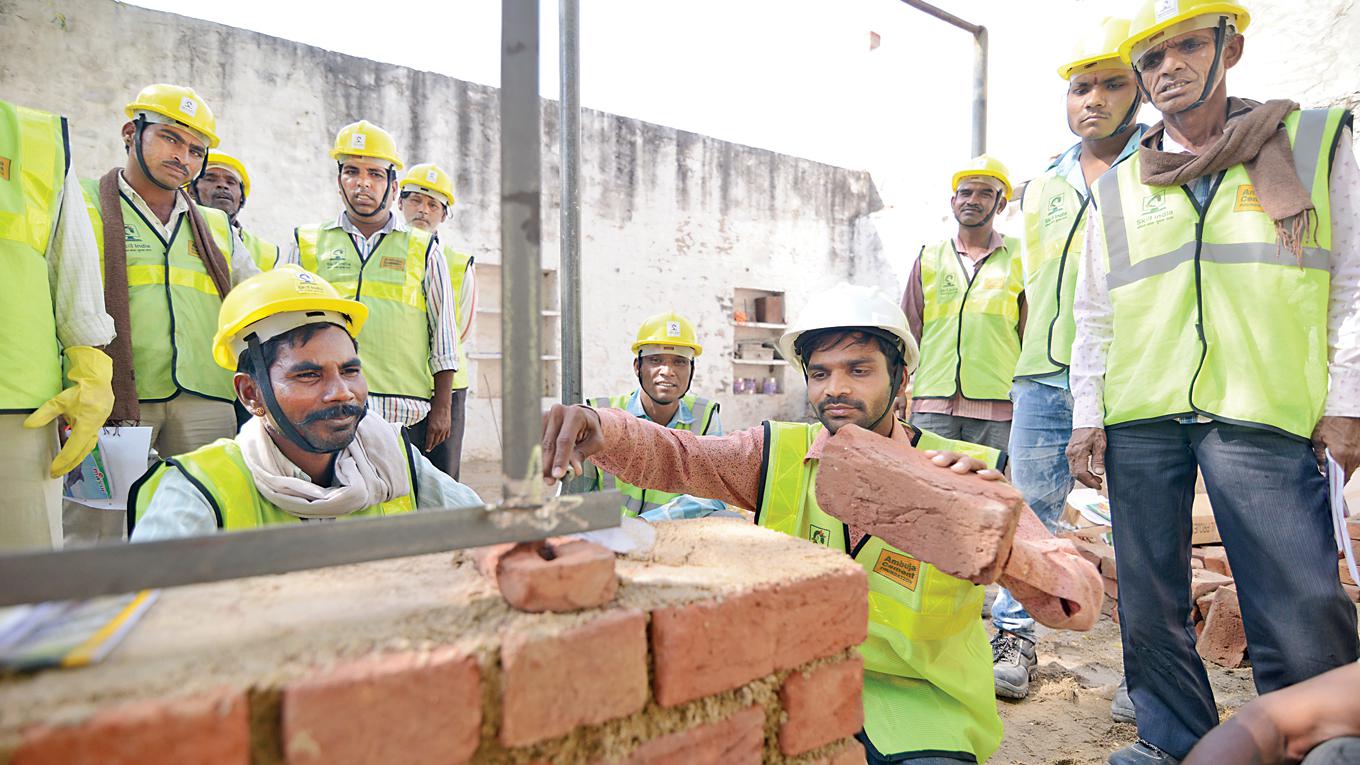-

The company has trained over 11,000 masons in the the initial phase of the programme
Ambuja Cements executes its CSR initiatives through the Ambuja Cement Foundation (ACF) and reaches out to 2.5 crore people in 29 locations across 11 states. The company considers the neighbouring community as its biggest stakeholder. Thus, with a team of over 500 employees, it has been investing in rural communities to make them self-reliant and help them prosper. Today the group has 30 skill and entrepreneurship institutes training 45,000 youth. Eager to address unemployment and impact livelihoods in rural India, ACF (established in 1993) has invested in the skill development ecosystem since 2006, providing training and employment opportunities to rural youth that helps to uplift them and their families out of poverty. Whilst training is provided in a variety of common skilling areas including welding, machinery, electrician, retail, mechanics, beautician, mobile phone repair among many others, ACF, in particular, noticed a lack of skills amongst construction workers and manual labourers. This is also a profession with a lot of migration as labourers pursue opportunities in different locations. They are also vulnerable and susceptible to exploitation, with low and uncertain daily wages. Through ACF, a Mason’s Training Programme was initiated to upskill labourers so they can understand key techniques in construction, and hone core skills to utilise in the future to take their earning capacity to the next level. ACF trained over 11,000 masons in the initial phase of the programme. Harnessing a team of community mobilisers and with a presence in 800 villages reaching out to 1.5 million people, ACF identified local candidates who were eager to join the trade or those who were familiar with masonry skills but did not have relevant certification or training. At the initial phase of developing a curriculum for this programme, Ambuja Cements’ technical expertise was harnessed. In order to optimise uptake of the course, ACF conducted the training at construction sites, and held training sessions in the early hours of the morning or during the night – enabling them to continue their wage-paying work whilst upgrading their skills at the same time.
-
A ‘basic training’ is targeted at existing labourers on construction sites who want to gain a trade – advancing and specialising in masonry
Mason training is provided at two different levels. The first level was for ‘basic training’ targeted at existing labourers on construction sites who wanted to gain a trade – advancing and specialising in masonry. The ACF course takes them through technical parameters and provides them with some practice, along with exposure visits to various sites in progress. Additionally, the company provides the tools, safety equipment and shows how to use them.
Enhancing agricultural livelihoods Working in rural areas, the Foundation has also tried to enhance agricultural livelihoods. As a result, ACF has worked with over 175,000 farmers to date. It also reaches out to 121,000 cotton farmers covering an area of 1.94 lakh hectare of land.
In a village in Gujarat, the team recognised that cotton farmers were struggling to earn a decent profit from their cotton produce. Farmers, due to lack of sound technical knowledge, were being fooled by input dealers and had turned their fields into dumping grounds for fertilisers and pesticides.
This not only affected their profits but also deteriorated soil health and overall land productivity. On the other hand, Better Cotton Initiative (BCI), Switzerland was looking for implementers to transform the cotton farming sector in various locations. BCI brings together producers, ginners, mills, traders, manufacturers, retailers, brands and civil society organisations in a global community committed to developing Better Cotton as a sustainable mainstream commodity.
As an implementing partner, Ambuja Cements collaborated with IDH – A Sustainable Trade Initiative who was responsible for financial control and monitoring and BCI to ensure knowledge building, liaising and capacity building. The implementation model includes farm support, farm assessment and monitoring and evaluation.
While working in focus locations, the biggest challenge was to address the overuse of agrochemicals. It wasn’t easy to break the age-old practices in agriculture and therefore the best strategy was to encourage farmers to record and share their on-field learnings post adoption of improved practices. ACF registered three farmer producer companies (FPCs) and is in the process of registering more to build capacity and put the system in place.
Extension volunteers were hired and trained for three to four years on the BCI principles to play a crucial role in the extension structure of FPCs. With the success and scale of the initiative, ACF has been elected as a member of the Global Council of Better Cotton Initiative.
Biogas
BioEnergy will showcase its innovative biogas technology in India
Mobility
Ather aims to produce 20,000 units every month, soon
Green Hydrogen
German Development Agency, GIZ is working on a roadmap for a green hydrogen cluster in Kochi
Renewable Energy
AGEL set to play a big role in India’s carbon neutrality target



















